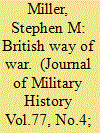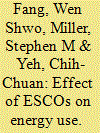|
|
|
Sort Order |
|
|
|
Items / Page
|
|
|
|
|
|
|
| Srl | Item |
| 1 |
ID:
125192


|
|
|
|
|
| Publication |
2013.
|
| Summary/Abstract |
This essay explores the impact of late Victorian cultural assumptions on the conduct of the South African War of 1899-1902, both at home and on the battlefield. It contends that three cultural values, intrinsic to late Victorian culture--cosmopolitanism, political egalitarianism, and race--shaped British soldiers' sense of justice at the outset of the war and, as a result, influenced their actions on and off the battlefield. This article emphasizes that the numerous "small wars" fought by British armies in the late nineteenth century, of which the South African War was the largest, were each unique and worthy of study not just as political history but as cultural military history
|
|
|
|
|
|
|
|
|
|
|
|
|
|
|
|
| 2 |
ID:
116973


|
|
|
|
|
| Publication |
2012.
|
| Summary/Abstract |
Energy saving can importantly help prevent greenhouse gas emissions and, thus, climate change. Energy service companies (ESCOs) provide a crucial instrument for delivering improved energy efficiency and potentially contributing to substantial energy savings in the public and private sectors. This paper investigates empirically the effect of ESCO activities on energy use. Based on a dynamic IPAT model, using a panel data of 94 countries over the period 1981 to 2007, we provide significant evidence that ESCOs reduce energy use. This finding proves robust to different dates of the first ESCO. The negative ESCO effect increases over time. The dynamic adjustment process produces small effects in the short run, but large effects in the long run. Moreover, the long-run ESCO effect differs across the stages of development. That is, for the high- and low-income countries, the short-run ESCO effect remains negative, but the long-run effects differ, remaining negative in high-income countries, but becoming positive in low-income countries. Finally, we discuss energy policy implications.
|
|
|
|
|
|
|
|
|
|
|
|
|
|
|
|
|
|
|
|
|